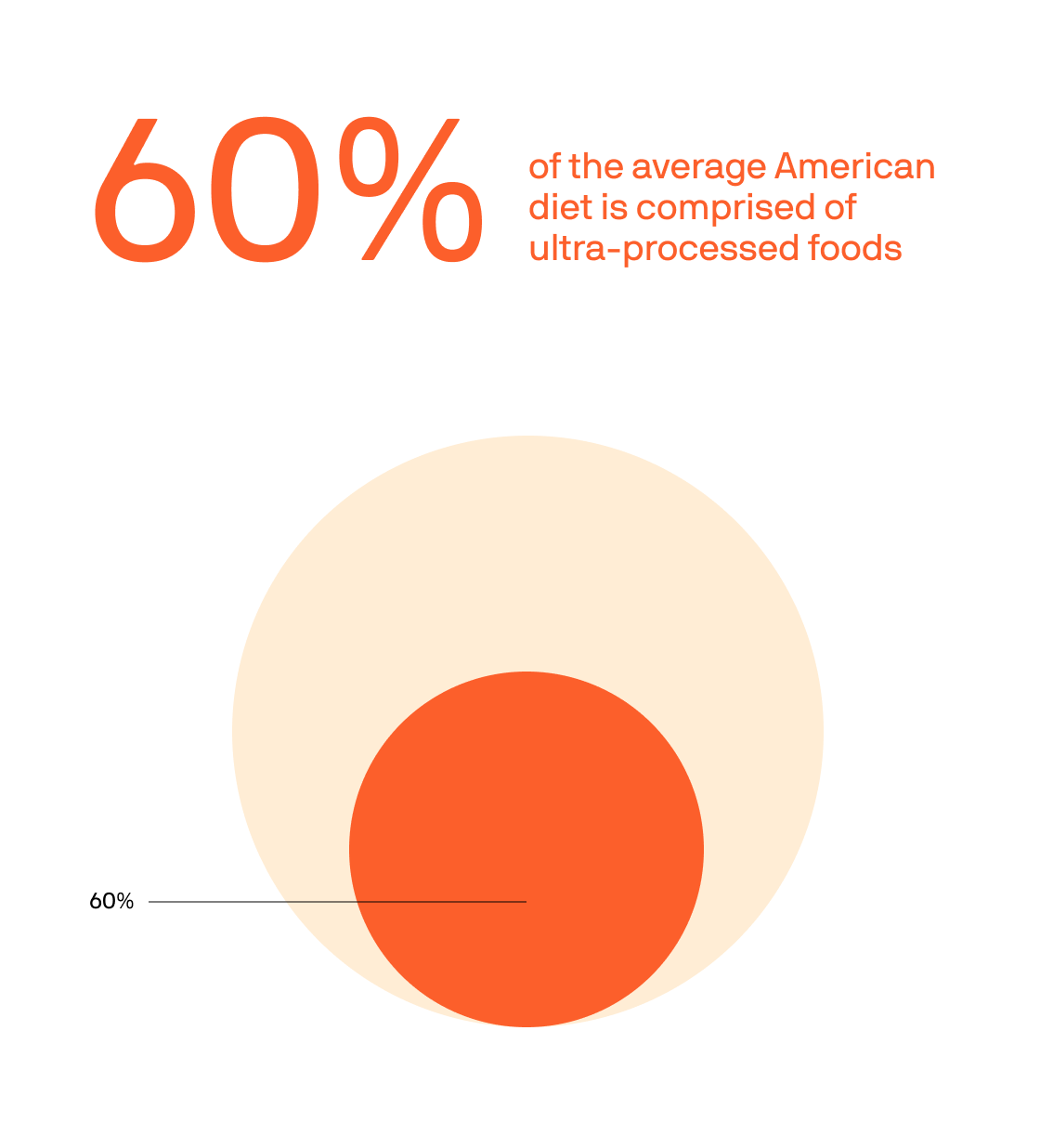Man cannot live on bread alone — especially not today.
The modern world exposes our systems to countless emergent challenges, including ultraprocessed and nutrient-deficient foods, environmental stressors such as pesticides and endocrine disruptors, and sedentary lifestyles that contribute to musculoskeletal issues and chronic disease.

These daily assaults on our bodies are having alarming effects:
- 31% of Americans are at risk of at least one major vitamin deficiency, and 94.3% of Americans do not meet the quota for nutritional vitamin D intake.1
- Age-related cellular decline, genetic mutations, and early-onset cancers are on the rise.
- The lifespan of the average American is going backwards.
Even if we do all we can to optimize our health — choose whole, nutritious foods, eliminate plastics, filter your water — our cells and organs are still battling increased challenges. This is where targeted pharmaceutical supplements can play a crucial role in enhancing health and longevity.
Today’s supplement aisle includes far more than just magnesium and melatonin: recent scientific breakthroughs have exploded the field, with new potential applications emerging daily — from nutrient extracts that target the inflammation that contributes to aging to compounds that improve gut bacteria balance shown to reduce the risk of colorectal cancer.
Read on to learn more about how supplements are transforming the field of healthcare — and how to harness the best for your own health goals.
The supplement industry lacks rigorous regulation standards, and many manufacturers rely on filler ingredients, unproven claims, and harmful additives. Ask your doctor before beginning any supplement regimen, and select trusted brands that undergo rigorous third-party testing.
1. Counteracting Aging
As we age, our bodies undergo a complex series of molecular and cellular changes that contribute to functional decline. This process, often referred to as "biological aging," affects virtually every system in our body:
- Mitochondrial Dysfunction: The powerhouses of our cells become less efficient, leading to reduced energy production and increased oxidative stress.2
- Nutrient Absorption: Decreased stomach acid production and enzyme activity inhibit the digestive system's ability to absorb and utilize nutrients.
- Hormonal Imbalances: Production of key hormones like testosterone, estrogen, and growth hormone naturally declines with age, affecting everything from metabolism to muscle mass3.
- Cellular Senescence: Cells age just as we do; when they are no longer functional, these “senescent” cells build up in our tissue, contributing to chronic inflammation and tissue dysfunction4.
Certain supplements have the potential to help mitigate these age-related declines.
Look for those that:
- Provide mitochondrial support
- Use targeted nutrients and digestive enzymes to overcome age-related absorption issues
- Restore hormonal balance
- Employ senolytic compounds to help clear senescent cells
2. Filling Nutritional Gaps
The modern American eater has access to supermarkets packed with options — and seriously devoid of nutrition. While we have immense abundance and far fewer deadly deficiencies (such as scurvy or rickets) than we did 100 years ago, we now rely on refined sugars and imbalanced fats and minerals that tax our bodies and lack crucial nutrients. Ultraprocessed foods and their “empty calories” now comprise over 60% of the average American diet 5.

Even if we do aim for a diet rich in whole foods, the nutritional density of many of our staple products has significantly declined over the last 50 years. Factors such as soil depletion, monoculture, climate change, and synthetic fertilizers have stripped our foods of many key minerals and vitamins. Case in point: In 1948, 100 grams of raw spinach contained roughly 10-13 mg of iron; today, that same handful of spinach contains only 2.7 mg of iron, a decline of 75%.
Carefully chosen supplements can help bridge this nutritional gap and compensate for the nutritional shortfalls in our modern food supply.
Look for:
- Micronutrient multivitamins that provide a broad spectrum of essential vitamins and minerals
- Phytonutrients such as flavonoids or carotenoids, highly concentrated extracts of plant-derived bioactive compounds
- Omega-3 fatty acids, a type of essential fat the body can’t produce on its own
3. Addressing Genomic Variations
Nutrigenomics — the study of how our genes interact with nutrients — shows that genetic variations can significantly impact how different individuals process and metabolize different nutrients. For example, genetic variations can affect:
- Nutrient Absorption: Some genetic variants can impair the absorption or utilization of certain nutrients.
- Detoxification Pathways: Genetic variations in enzymes involved in detoxification can affect how efficiently our bodies process and eliminate toxins6.
- Metabolic Processes: Genes can influence how we metabolize macronutrients, potentially affecting the risk for various health conditions like obesity, type 2 diabetes, and cardiovascular disease7.
Look for:
- Personalized supplementation based on genomic variations should only follow genetic testing — your healthcare provider can help you decide whether this is right for you. Superpower’s in-depth and advanced blood testing can also allow you to keep track of nutrient levels over time, which could indicate potential deficiencies.
4. Supercharging Healing
While the human body has remarkable healing capabilities, certain compounds can amplify and accelerate these natural processes. This is especially useful for acute musculoskeletal conditions, autoimmune disease, intestinal permeability, and even hair loss.
Look for:
- NAD+ Precursors like Nicotinamide Riboside (NR) and Nicotinamide Mononucleotide (NMN) that may potentially enhance cellular repair processes and mitochondrial function8.
- Specialized Pro-Resolving Mediators (SPMs), derived from omega-3 fatty acids, that play a crucial role in resolving inflammation and promoting tissue repair9
- Collagen peptides that supercharge the body’s ability to rebuild skin, cartilage, and bones.
5. Detoxification
Modern life exposes us to an unprecedented array of environmental toxins, placing a significant burden on our body's detoxification systems. This increased toxic load — combined with lifestyle factors such as disrupted circadian rhythms and chronic stress — can accelerate cellular aging, heighten oxidative stress, and contribute to various chronic health issues. Thankfully, new research has uncovered targeted compounds that may help counteract these effects.
Look for:
- Gut binders (think chlorella or activated charcoal) that encourage digestive detoxification
- Certain B vitamins (such as B2, B6, and B12) that support liver function through methylation
- Antioxidants (e.g. vitamin C) to neutralize free radicals generated during detoxification.
Personalization is Key
Let’s be clear: no one pill will take the place of a balanced diet, regular physical activity, or quality medical care. But targeted, personalized supplements can be immensely beneficial, helping to address nutritional gaps, increase the potential for longevity, and enable us to feel and function at our best.
Superpower’s 100+ lab tests can identify potential disease markers, indicate vitamin or hormonal deficiencies, and even estimate your true “biological age.” Your personalized action plan then provides specific recommendations for targeted supplements that have been extensively vetted to help you optimize your biology and meet your health goals.

References
[1] Reider, C. A., Chung, R.-Y., Devarshi, P. P., Grant, R. W., & Mitmesser, S. H. (2020). Inadequacy of immune health nutrients: Intakes in US adults, the 2005–2016 NHANES. Nutrients, 12(6), 1735. https://doi.org/10.3390/nu12061735
[2] López-Otín, C., Blasco, M. A., Partridge, L., Serrano, M., & Kroemer, G. (2013). The hallmarks of aging. Cell, 153(6), 1194–1217. https://doi.org/10.1016/j.cell.2013.05.039
[3] Chahal HS, Drake WM. (2007). The endocrine system and ageing. J Pathol, 211(2), 173-180. https://doi.org/10.1002/path.2110
[4] Xu M, et al. (2018). Senolytics: A new therapeutic avenue for aging-related diseases. Nat Med, 24(8), 1246-1256. https://doi.org/10.1038/s41591-018-0092-9
[5] Centers for Disease Control and Prevention. (2025, August 7). Americans get more than half their calories from ultra-processed foods, CDC report says. The Associated Press. https://apnews.com/article/9d025cd075a3b7bda2d3710da6d3f541
[6] Liska DJ. (1998). The detoxification enzyme systems. Altern Med Rev, 3(3), 187-198. https://pubmed.ncbi.nlm.nih.gov/9630736/
[7] Corella D, Ordovas JM. (2009). Nutrigenomics in cardiovascular medicine. Annu Rev Nutr, 29, 283-327. https://doi.org/10.1146/annurev.nutr.080508.141242
[8] Rajman L, et al. (2018). Therapeutic Potential of NAD-Boosting Molecules: The In Vivo Evidence. Cell Metab, 27(3), 529-547. https://doi.org/10.1016/j.cmet.2018.02.011
[9] Serhan CN, Levy BD. (2018). Resolvins in inflammation: emergence of the pro-resolving superfamily of mediators. J Clin Invest, 128(7), 2657-2669. https://doi.org/10.1172/JCI97943



.svg)






.avif)







.png)